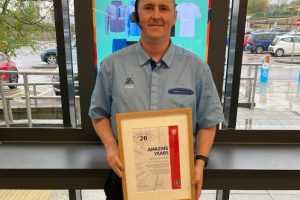IN A SHOCKING incident that unfolded on Swansea beach, two drug dealers were apprehended by the police while selling heroin and crack cocaine to addicts in broad daylight. Tamim Mohammadi, 18, and Tamika Rosser, 21, were found in the sand dunes with numerous wraps of Class A drugs and over £700 in cash. The arrests were made after the police responded to reports of suspicious behavior in the area.
According to the prosecution’s account presented at Swansea Crown Court, on May 19 of this year, police officers patrolling Swansea seafront received information about a group of individuals believed to be involved in drug supply on the beach. Acting on the tip-off, the officers proceeded to investigate and discovered Mohammadi and Rosser in the sand dunes. The court was informed that several known drug users approached the defendants and briefly engaged with them before leaving.
Upon the arrival of additional officers, the police moved in and arrested the two suspects. A search near the defendants’ location led to the discovery of a small black Nike bag containing seven wraps of heroin. Further searches revealed that Mohammadi had £720 in cash on him, while Rosser had 25 wraps of heroin and 67 wraps of crack cocaine concealed in her underwear. The police also seized Mohammadi’s phone and uncovered incriminating messages related to drug dealing, as well as a dealer’s “tick list,” after gaining access using the defendant’s disclosed PIN. Additionally, a search conducted at a property linked to Mohammadi uncovered four mobile phones, more crack cocaine, cling film covered in a brown residue, and a machete.
During the court proceedings, Mohammadi, a resident of Chaucer Avenue, Hounslow, London, pleaded guilty to possession of cocaine with intent to supply, possession of heroin with intent to supply, being concerned in the supply of cocaine, and being concerned in the supply of heroin. Notably, he had no prior convictions. On the other hand, Rosser, formerly of Mansel Street in Swansea but currently without a fixed abode, admitted to possession of cocaine with intent to supply and possession of heroin with intent to supply. She had a history of eight previous convictions for offenses including possession of an offensive weapon, making threats to kill, robbery, assault, assault of an emergency worker, theft, and criminal damage. In 2019, she was sentenced to two years and eight months in prison for her involvement in a gang that targeted and attacked takeaway delivery drivers in Swansea’s Penlan area.
Ashanti-Jade Walton, representing Mohammadi, argued that her client had a challenging upbringing, residing in temporary accommodation with his mother and siblings. Despite the difficulties, he had completed his A-levels and had the potential to play semi-professional football. Walton revealed that Mohammadi met Rosser during a visit to Swansea and started a relationship with her. He planned to take her back to London to help her overcome her drug addiction. The defense attorney acknowledged Mohammadi’s financial struggles and stated that he resorted to selling drugs out of desperation. She also highlighted his deep remorse, noting that he had not even disclosed the impending sentencing hearing to his family.
Andrew Evans, representing Rosser, shed light on her upbringing, stating that she was born to a drug-using mother who is presently serving a lengthy prison sentence for drug trafficking. He asserted that drugs had been a pervasive part of Rosser’s life since her teenage years, and she desired to break free from that environment once released from custody.
In delivering the sentences, Judge Huw Rees condemned the defendants for perpetuating a grave social problem within the community. He warned them about the escalating consequences if they persisted in their drug dealing activities, jeopardizing their futures. Mohammadi received a sentence of 28 months in youth detention, taking into account a one-third discount for his guilty pleas. Rosser, on the other hand, was sentenced to 40 months in prison. Both defendants will serve up to half of their respective sentences in custody before being released on license to complete the remainder within the community.
Expressing dissatisfaction with the police report, Judge Rees instructed the prosecutor to convey to the police that the MG5 document, which provides a summary of the case, was “wholly inadequate.”
This incident serves as a reminder of the ongoing battle against drug-related crimes, urging law enforcement agencies to remain vigilant in their efforts to combat drug trafficking and addiction within local communities.
















